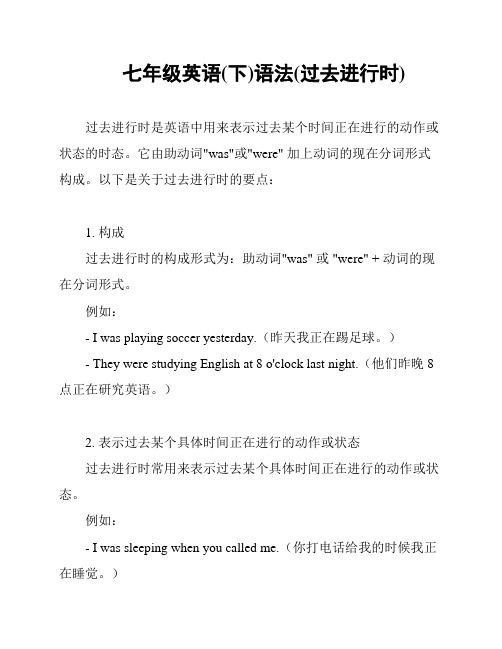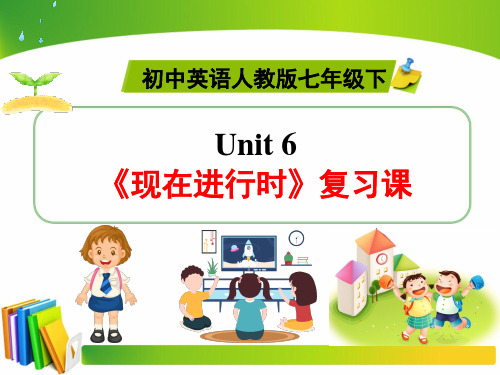七年级英语下学期时态
七年级英语七年级下册时态复习

七年级英语七年级下册时态复习在七年级英语下册的学习中,时态是非常重要的语法知识点。
掌握好时态,对于我们准确地表达思想、理解英语语言有着至关重要的作用。
接下来,让我们一起对七年级下册所学的时态进行一次全面的复习。
一、一般现在时一般现在时表示经常发生的动作或存在的状态。
当主语是第三人称单数时,动词要发生相应的变化。
比如,“He plays football every day” 中的“plays”就是动词“play”的第三人称单数形式。
一般现在时的构成:1、主语+ be(am/is/are)+表语I am a studentThey are happy2、主语+实义动词(注意第三人称单数形式)We study hardShe likes music常与一般现在时连用的时间状语有:always, usually, often, sometimes, never, every day/week/month/year 等。
二、现在进行时现在进行时表示正在进行的动作。
其构成是“主语+be(am/is/are)+现在分词”。
例如,“I am reading a book now”现在分词的构成规则:1、一般情况下,直接在动词后加 ing,如:read reading。
2、以不发音的 e 结尾的动词,去掉 e 再加 ing,如:write writing。
3、以重读闭音节结尾,且末尾只有一个辅音字母的动词,双写这个辅音字母再加 ing,如:run running。
常与现在进行时连用的时间状语有:now, at the moment, look, listen 等。
三、一般过去时一般过去时表示过去发生的动作或存在的状态。
其构成有两种:1、主语+ was/were +表语I was at home yesterdayThey were late for school2、主语+动词的过去式She played the piano last nightWe went to the zoo last week动词过去式的构成规则有很多,常见的有:1、一般在动词后加 ed,如:work worked。
七年级英语(下)语法(过去进行时)

七年级英语(下)语法(过去进行时)过去进行时是英语中用来表示过去某个时间正在进行的动作或状态的时态。
它由助动词"was"或"were" 加上动词的现在分词形式构成。
以下是关于过去进行时的要点:1. 构成过去进行时的构成形式为:助动词"was" 或 "were" + 动词的现在分词形式。
例如:- I was playing soccer yesterday.(昨天我正在踢足球。
)- They were studying English at 8 o'clock last night.(他们昨晚8点正在研究英语。
)2. 表示过去某个具体时间正在进行的动作或状态过去进行时常用来表示过去某个具体时间正在进行的动作或状态。
例如:- I was sleeping when you called me.(你打电话给我的时候我正在睡觉。
)- He was watching TV last night.(昨晚他正在看电视。
)3. 表示两个同时进行的动作或状态过去进行时也可以用来表示过去两个同时进行的动作或状态。
例如:- While she was cooking, he was cleaning the house.(她在做饭的同时,他在打扫房子。
)- They were playing basketball while it was raining.(下雨的时候他们在打篮球。
)4. 动词的现在分词形式动词的现在分词形式一般是在动词原形的基础上加上"-ing"。
例如:- work -> working- swim -> swimming过去进行时是一个重要的时态,掌握了过去进行时的用法,可以更准确地描述过去的动作和状态。
希望这份文档对你有所帮助!。
七年级下册数英语知识点

七年级下册数英语知识点在初中阶段,数学和英语都是非常重要的学科,其中数学对于一些学生来说可能是比较容易理解的,而英语就相对来说比较难学了。
特别是在七年级下册,英语有很多重点难点需要掌握,本文将为大家梳理一下这些数英语知识点。
一、动词时态动词时态对于英语学习来说非常重要,是英语语法中的基础部分。
在七年级下册,动词时态主要有以下几种,包括一般现在时、一般过去时、一般将来时、现在进行时、过去进行时、现在完成时等。
其中,一般现在时和一般过去时用的比较多,一般现在时用于叙述现在的情况或客观事实,而一般过去时则用于叙述过去的事件或事情。
在使用动词时态时,要注意时态的一致性。
二、数词和序数词在七年级下册的英语教材中,数词和序数词也是比较基础的知识点,是需要学生掌握的。
数词用于表示数量,包括基数词和序数词。
基数词表示数量,例如one、two、three等。
在使用基数词时需要注意复数形式的变化,以及和不定冠词的搭配。
序数词则表示顺序,例如first、second、third等。
在使用序数词时要注意和基数词的区别以及带有序数词的日期和序数词的后缀。
三、名词名词是英语中最基础的语法之一,在七年级下册的课程中,名词在句子中的作用非常重要。
名词分为可数名词和不可数名词两种,可数名词有单数和复数之分,而不可数名词则没有复数形式。
在使用名词时,需要注意名词的单复数、名词与形容词的搭配以及名词与冠词的搭配等。
四、代词代词是指在代替名词的时候使用的词语,对于学习英语来说也是非常重要的语法部分。
在七年级下册的英语教材中,代词主要分为人称代词、物主代词、反身代词、指示代词、疑问代词和不定代词等。
在使用代词时需要注意代词的种类和用法,以及人称的对应关系等。
五、介词介词也是英语语法中比较基础的部分,介词在句子中的作用是连接名词、代词、动名词、动词及其他介词短语等。
在七年级下册英语知识点中,比较常见的介词包括in、on、at等。
在使用介词时需要注意介词与名词、形容词和动词的搭配,以及介词的短语和词组等。
七年级下册英语时态专项-一般现在时-现在进行时-一般过去时-讲解与测试

一、一般现在时:概念:经常、反复发生的动作或行为及现在的某种状况。
时间状语:always, usually, often, sometimes, every week (day, year, month…), once a week, on Sundays, etc.基本结构:①be动词;②行为动词否定形式:①am/is/are+not;(isn't,aren't)②此时态的谓语动词若为行为动词,则在其前加don't,如主语为第三人称单数,则用doesn't,同时还原行为动词。
一般疑问句:①把be动词放于句首;②用助动词do提问,如主语为第三人称单数,则用does,同时,还原行为动词。
即:含be动词的一般现在时结构:肯定句:主语+ be+ 其它。
《否定句:主语+ be+not + 其它。
一般问句:Be+主语+ 其它?特殊疑问句:(特殊疑问词+一般疑问句)特殊疑问词+be+主语+其它?含实义动词的一般现在时结构:肯定句:主语+动词原形/动词三单形式+其它。
否定句:主语+don't/doesn't+动词原形+其它。
一般问句:Do/Does+主语+动词原形+其它?特殊疑问句:(特殊疑问词+一般疑问句)特殊疑问词+do/does+主语+动词原形+其它?!一、写出下列动词的单三形式:(一)1.go__________2. catch _________3. brush_________4. wash___________5. do________6. like________7. have___________8. watch ___________9. drink ___________ 10.fly___________ 11.say___________ 12.learn ___________ 13.eat___________ 14.read___________ 15.sing___________ brush________(二)study_______ stay _____ make ___look ____ pass____ carry ____ come_______ watch_____ plant______ teach_______、二、用括号内动词的适当形式填空。
英语七年级下册人教版一般将来时和一般现在时两种时态笔记概念构成动词形式

英语七年级下册人教版一般将来时和一般现在时两种时态笔记概念构成动词形式1.一般现在时(1)结构:当主语是第三人称单数时,谓语动词用第三人称单数形式。
(2)动词的第三人称单数形式变化规则如下:①直接加s。
如:work-works。
②以“辅音字母+y”结尾的词,先变y为i,再加es。
如:carry-carries;cry-cries;try-tries;study一studies。
③以s,x,o,ch,sh结尾的词加es。
如:wash-washes;teach-teaches;go-goes;pass一passes;fix-fixes。
④特殊:have has;am/are is(3)用法:①表示习惯性的动作。
常与seldom,often,usually,always,sometimes,today,every day,once a week,every five minutes,on Sundays等时间状语连用。
如:I go to school at seven every day.我每天七点去上学。
②表示普遍真理和客观事实。
如:The earth goes around the sun.地球绕着太阳转。
③表示在现里所发生的一个动作。
如:Here comes the bus.公共汽车来了。
④在时间和条件状语从句中代替一般将来时。
如:I'll go shopping with my mother if sheis free tomorrow.如果明天我妈妈有空,我将和她去购物。
3.一般将来时(1)结构:助动词shall/will+动词原形;be going to+动词原形(2)用法:①表示将要发生的动作或状态,常用的时间状语有later(on),soon,in a month(in+时间段),next time,from now on,tomorrow等。
如:I shall be eighteen years old next year.明年我就18岁了。
人教版英语七年级下册《现在进行时时态--活动复习课》PPT教学课件

__(play) football in the football field now.
4.Father isn’t at home. He __is__w_o_r_k_in_g__(work).
5.It’s seven o’clock now.
What is Lu siqi doing?
பைடு நூலகம்
Can you find the differentces?
• Watch-----watching • make ----- making • sit ---- sitting • lie ---- lying
动词的现在分词的变化规则
1 一般的动词,直接在动词后加ing work -- working sleep -- sleeping study -- studying 2 以不发音字母e结尾的动词,要先去e加ing
classroom.
Ⅲ. 选择填空.
1. My mother is __D___TV.
A. looking at B. seeing
C. reading D. watching
2. --__C__ you ____ a book? --Yes, I am.
A. Do, read
B. Are, read
-- No, he isn’t.
10.Tom _i_s_p__la_y_i_n_g_ (play) the piano in the room.
Please ask him to come here.
11. Listen! They _a_r_e__s_in__g_in__g_(sing) in the
七年级英语(下)时态归纳 文本文档
8. The bad children ___________(not do) their homework every day.
9. Don’t talk. I’m______ (do) my homework.
10 What is he doing? He ______(write) a letter.
( )9. What are you doing? I’m ______TV.
A. watch B. watches C. to watch D. watching
( )10. We _____________ any Chinese classes on Friday.
2. dance__________ have__________ write__________ take__________
3. run__________ sit__________ shop__________ swim__________
3. go__________ do___________
4. study__________ fly__________ cry__________ play__________
5. have_________
三、根据中文意思完成句子
1、学生们在干什么?有一些在打电话,另一些躺在沙滩上。_____ _____ the students _____? Some _____ _____ on the phone, _____ _____ _____ on the beach.
15. Stop ______(talk). The teacher comes in.
16. There _____(be) many people here on vacation. Some _______(take) photos. Others_______(lie) on the beach. Look at this group of people ______(play) beach volleyball.
初中英语人教版七年级下册时态复习
时态复习教学设计时态:在英语中,不同时间发生的动作或存在的状态要用不同的动词形式来表现。
本节课重点掌握:每种时态的概念、时间标志词、结构、句式变化、以及某些时态间的相互转换。
一现在进行时(1)定义:现在正在进行的动作。
(2)时间标志词:now Look! Listen! Where is …?Don’t talk! It’s 8:00 a.m.(3)结构:主语+am/is/are+V-ing(现在分词)(4)否定句:主语+am not/isn’t/aren’t +V-ing+……(5)一般疑问句:Am/Is/Are +主语+V-ing+……?二一般现在时(1)定义:经常或习惯性的动作或存在的状态。
(2)时间标志词:always , usually, often, sometimes ,seldom,never, every day, every… ,three times a day(3)结构:主语+V 原形/V单三+…主语+am/is/are+…(4)否定句:主语+don’t/doesn’t + V原形+……主语+am not/isn’t/aren’t +……(5)一般疑问句:Do/Does +主语+ V原形+……?Am/Is/Are + 主语+……?三一般过去时(1)定义:过去某个时间或时间段发生的动作或存在的状态。
(2)时间标志词:last night, last…, two days ago, …ago,in 1999, in +过去的年份, just now ,yesterday, yesterday morning(3)结构:主语+V-ed+……(过去式)主语+was/were+……(4)否定句:主语+didn’t + V原形+……主语+wasn’t/weren’t +……(5)一般疑问句:Did +主语+ V原形+……?Was/Were + 主语+……?四时态间相互转换1.She got up at seven o'clock yesterday.(用now改写)She is getting up now .(用every day改写)She gets up at seven o'clock every day. 2. Look!Tom is cleaning his room.(用on weekends 改写)Tom cleans his room on weekends. (用two hours ago改写)Tom cleaned his room two hours ago.3. I usually wash my clothes in the afternoon.(用now改写) I am washing my clothes now.(用last weekend改写) I washed my clothes last weekend.五.练习用所给动词适当形式填空:1. Listen, who____________ (play) the piano?2. .Li Hui’s family ____________ (move) to Shanghai ten years ago.3. The students of Class Five____________ (clean) their classroom every Friday.4. Be quiet, they____________ (have) a meeting now.5. .If it____________ (not rain),we____________ (go) to the park tomorrow.6. It ____________ (be) rainy the day before yesterday.7. Sometimes Zhao Fang____________ (watch) TV after school.8. --- Where is Tony?--- He____________ (cook) dinner for his family.9. My sister____________ (not be) in China in 2009.10. These boys____________ ( listen) to the English program twice a week.11. It’s 12:00. People____________ (swim)in the swimming pool.12. My mother____________ (feed) the dog just now.13. ____________ (not speak) loudly(大声地). The baby____________ (sleep).14. Jim____________ (not watch) TV on school days.15. The workers____________ (build) the big swimming pool last year.句型转换16. Sometimes she goes shopping with her mother. (对划线部分提问)How ___________ ___________ she ___________ shopping with her mother?17. He is waiting for a policeman.(对划线部分提问)_____________ is he ___________ for?18. It was cold yesterday. ?(对划线部分提问)_______________________________?19. He sang some English songs. (用now改写)He ___________ ___________ some English songs now.20. I often have lunch at school.(用he 改写)He ___________ ___________ lunch at school.21. I think he is right. (改为否定句)______________________________.22. They are flying to Japan.(同义句)They are ___________ to Japan ___________ ___________.23. He usually has a rest for twenty minutes.(对划线部分提问)_____________________________________?24. Do you watch TV on Sunday?(用last Sunday?改写成过去时态的句子) _____________________________________?25. She is writing a letter.(对划线部分提问)___________ is she ___________?26. The boys visited China last year. (提问)___________ ___________ the boys ___________ China?26. He reads English after class.(用now代替after class改换时态)_____________________________________?27. Frank read an interesting book about history.(改为一般疑问句)___________ Frank___________ an interesting book about history?28. Lily is helping the old man do housework. (用often改写句子)Lily ___________ ___________ the old man do housework.29. Tom did the dishes last night. (改为否定句)Tom ___________ ___________ the dishes last night.30. It took them an hour to put up the tent. (改写同义句)They ___________ an hour ___________ ___________ the tent.。
七年级下时态知识点归纳
七年级下时态知识点归纳在学习英语的过程中,时态是一个重要的知识点。
不同的时态表达不同的时间,理解时态的使用可以帮助我们准确表达自己的意思。
本文将对七年级下学期英语时态知识点进行归纳总结。
1. 一般现在时一般现在时表示经常性或习惯性的动作或状态,用于表示现在的情况或真理。
结构:主语 + 动词原形(第三人称单数加s)。
例句:I always brush my teeth before going to bed.(我总是睡觉前刷牙。
)2. 现在进行时现在进行时表示正在进行的动作或者现阶段正在发生的情况。
结构:主语 + am/is/are + doing。
例句:I am reading a book now.(我正在看书。
)3. 一般过去时一般过去时表示过去发生的动作或状态。
结构:主语 + 动词的过去式。
例句:He played football yesterday.(他昨天踢足球。
)4. 过去进行时过去进行时表示过去某一时间正在进行的动作。
结构:主语 + was/were + doing。
例句:We were studying English at this time last night.(昨晚这个时候我们在学英语。
)5. 一般将来时一般将来时表示将来的某个时间会发生的动作或状态。
结构:主语 + will/shall + 动词原形。
例句:I will go to school tomorrow.(我明天上学。
)6. 现在完成时现在完成时表示过去发生的动作对现在产生的影响或结果。
结构:主语 + have/has + 过去分词。
例句:I have finished my homework.(我已经完成了我的作业。
)7. 过去完成时过去完成时表示在过去某一时刻之前已经完成的某个动作或状态。
结构:主语 + had + 过去分词。
例句:By the time I got home, he had already left.(当我回家时,他已经离开了。
英语七年级下册现在进行时态总结与应用
英语七年级下册现在进行时态总结与应用现在进行时态概述现在进行时态表示正在进行或发生的动作,通常由“be”动词加上现在分词构成。
例如:- I am eating breakfast.(我正在吃早餐。
)- Tom is playing soccer.(汤姆正在踢足球。
)- They are studying for the exam.(他们正在备考。
)现在进行时态用法表示现在正在进行的动作现在进行时态最常用的用法是表示现在正在进行的动作。
例如:- She is talking on the phone right now.(她现在正在打电话。
)- John is watching TV.(约翰在看电视。
)表示现阶段的活动或变化现在进行时态还可以用来表示现阶段正在进行的活动或变化。
例如:- He is getting better at playing chess.(他现在下西洋棋越来越厉害了。
)- Our sales team is working hard to meet the sales target.(我们的销售团队正在努力实现销售目标。
)表示暂时状态现在进行时态还可以用来表示暂时的状态。
例如:- He is living in New York at the moment.(他现在暂住在纽约。
)- Are you still working as a teacher? No, I'm studying to be a nurse.(你还是老师吗?不,我现在在研究成为一名护士。
)注意事项- 现在进行时态不能和表示瞬间动作的时间副词连用,例如“now”、“at the moment”等。
- 表示状态、情感和想法的动词通常不用于现在进行时态,例如“know”、“believe”等。
以上是英语七年级下册现在进行时态总结与应用。
- 1、下载文档前请自行甄别文档内容的完整性,平台不提供额外的编辑、内容补充、找答案等附加服务。
- 2、"仅部分预览"的文档,不可在线预览部分如存在完整性等问题,可反馈申请退款(可完整预览的文档不适用该条件!)。
- 3、如文档侵犯您的权益,请联系客服反馈,我们会尽快为您处理(人工客服工作时间:9:00-18:30)。
1.Lucy did her homework at home.(改否定句) didn’t _______ do her homework at home. Lucy _______
2.I could get you a new book. (改否定句) could ______get not I_____ you a new book. 3.He went to school yesterday. (改否定句) didn't ______ go to school yesterday. He_____ 4.I was a student ten years ago. (改否定句) I wasn't _____ a student ten years ago.
• I was a student ten years ago. • I could get you a new book.
• He went to school yesterday.
一般过去时态的“三变”技巧
一变:肯定句变为否定句 【技巧1】当句中含有情态动词could, would,should等时,可直接在其后面加not 构成否定句。例如: I could get you a new book. → I could not / couldn't get you a new book.
二变:陈述句变为一般疑问句 【技巧1】移动词语的位置。将was, were, could,would,should等移到句首。 例如: He could ride a bike . → Could he ride a bike? Yes,he could.No,he couldn’t.
【技巧2】添加助动词did。谓语是除情态 动词、助动词、系动词was, were以外的 动词时,在主语之前加did,动词还原。 例如: Mr Li looked very old. → Did Mr Li look very old? Yes,he did. No,he didn’t.
9. How many lessons _____ does your classmate ______(have) on have Monday?
does his mother 10. What time ______ do _____(do) the housework?
现在进行时
表示现在正在进行或发生的动作。
does do 4. What ______he usually______ (do) after school?
5. Danny________(study) studies English, Chinese, Maths, Science and Art at school.
6. Mike sometimes goes _____(go) to the park with his sister. 7. At eight at night, she watches ____ (watch) TV with his parents. Does 8. _____ Mike read ____(read) English every day?
【技巧2】当句中含有系动词was,were 时, 可直接在其后加not构成否定句。例如: I was a student ten years ago. → I was not / wasn't a student ten years ago.
【技巧3】当句中谓语是除情态动词、助动 词、系动词was, were以外的动词时,在 该动词之前加did not / didn't,动词还原, 构成否定句。例如: He went to school yesterday. → He did not / didn' go to school yesterday.
• 一般过去时
一、写出下列动词的过去式形式
went enjoy _______buy enjoyed bought eat _______ ate go _______ _______
got made took dance ______ danced get _______ make _______take_______
wrote run _______swim ran swam found write _______ _______ find _______ began told played study ______ studied begin _______ tell _______play _______
am/is ______are_______do________ was were did
现在进行时的构成 be+ving 肯定句: 主语+ am/is/are+ doing +其他+时状. Eg: He is doing his homework now. 否定句:主语+am/is/are +not+ doing+其他+时状. Eg: He is not doing his homework now. 一般疑问句: Am/Is/Are +主语+ doing+其他+时状? Eg: Is he doing his homework now? 肯定回答:Yes,主语 +am/is/are Eg :Yes, he is. 否定回答:No, 主语+am not/isn’t/aren’t Eg: No, he isn’t.
填空: 1. She _____ (walk) now.
2.Look, Nick _____ ( come).
3.Listen, she _____ (sing). 4.Look, the girl is _____ (run). 5.The cat is _____ (eat) now.
四。选择题 1. Who _____ over there now? A. singing B. are sing C. is singing D. sing 2. It’s eight o’clock. The students _____ an English class. A. have B. having C. is having D. are having 3. Listen! The baby _____ in the next room. A. crying B. cried C. is crying D. cries 4. Look! The twins _____ new sweaters. A. are wearing B. wearing C. are wear D. is wearing 5. Don’t talk here. Grandparents _____. A. is sleeping B. are sleeping C. sleeping D. sleep 6. Tom is a worker. He ____ in a factory. His sisters _____ in a hospital. A. work/ work B. works/ work C. work/ works D.works/works
7. Who _____ English best in your class? A. speak B. speaks C. speaking 8. Mrs Read _____ the windows every day. A. is cleaning B. clean C. cleans 9. We _____ music and often _____ to music. A. like/ listen B. likes/ listens C. like/ are listening 10. She _____ up at six in the morning. A. get B. gets C. getting 11. On Sundays he sometimes _____ his clothes and sometimes _____ some shopping. A. wash/ do B. is washing/ is doing C. washes/ does 12. The twins usually _____ milk and bread for breakfast, but Jim _____ some coffee for it. A. have/ have B. have/ has C. has/ have
1. We often _____ play (play) in the playground.
gets (get) up at six 2. He ______ o’clock. brush (brush) your Do 3. _____ you _____
teeth every morning?
现在进行时练习 一.写出下列动词的现在分词形式 work___ sing ___ play___ study____ have ___ dance ___ write___ take____ run___ sit___ shop__ swim___
填入be动词的适当形式 1. He _____ drinking water. 2. The eagle(鹰) _____ flying in the sky. 3. Children _____ playing in the playground. 4. They _____ working now. 5. I _____ going to the supermarket. 6. I _____ coming. 7. He _____ walking in the woods now.
经常的或习惯性的动作或存在的状态。
时间状语:often ,usually, always, sometimes, every day, at 3 o’clock…
